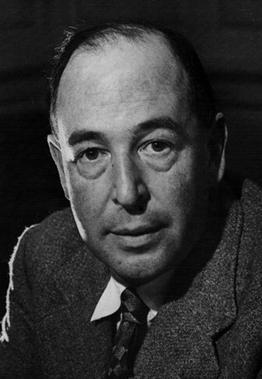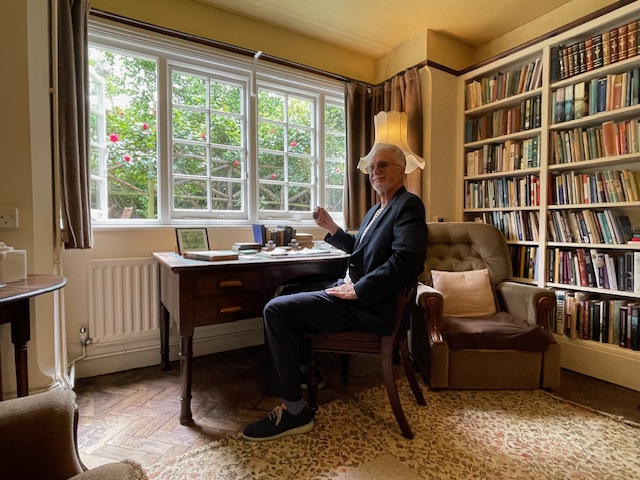Why C.S. Lewis Plays a Prominent Role in My Intellectual Life
July 24, 2025

C.S. Lewis Devotional No. 1: Why C.S. Lewis Plays a Prominent Role in My Intellectual Life
This past May, Steve Moore, CEO emeritus of the M.J. Murdock Charitable Trust, and I had the joy of leading a group of fellow Christians on a trip we called "In the Footsteps of Faith" to Ireland and England. Our primary goal was to introduce the participants to Christians in those countries who had remained faithful to God's call in their time. In particular we engaged them in conversations around the writings of J.R.R. Tolkien and C.S. Lewis. As part of the gathering, I was asked to convey why the works of C.S. Lewis are important to me and I include those general thoughts here. They are not intended to be scholarly comments on the works of Lewis but my personal reflections on the stories and how they have affected my journey with Christ. I hope they are an encouragement to you as well.
 Most people believe that my interest in C.S. Lewis likely came from reading his children's stories as a child, but that isn’t the case. I had never heard of Lewis until I was an adult. I was raised in a strong Christian home where my mother taught us to love books and reading, but the works of Lewis, and Tolkien for that matter, did not appear on our list. My mother didn’t ignore or dislike the Lewis stories; they were simply unknown to our religious community.
Most people believe that my interest in C.S. Lewis likely came from reading his children's stories as a child, but that isn’t the case. I had never heard of Lewis until I was an adult. I was raised in a strong Christian home where my mother taught us to love books and reading, but the works of Lewis, and Tolkien for that matter, did not appear on our list. My mother didn’t ignore or dislike the Lewis stories; they were simply unknown to our religious community.
Our family has been part of the Southern Baptist church and the broader Baptist movement for several generations. Reading the Bible, memorizing Scripture, and having knowledge of the stories took precedence in our home to understand God’s work in the world. I think there was a general assumption in our community that Christian development and discipleship only required knowledge of and commitment to Scripture.
Beyond my mother’s perspective, the wider Southern Baptist network seemed to harbor a fear that "secular" stories might lead us astray, often viewing literary authors with skepticism. The sentiment was that “the imagination was the tool of the devil, and it was far better to keep a serious mind than to explore fantasy and fiction.”
Thus, when I attended a Southern Baptist university I took almost every Bible course I could find time for and made every attempt to avoid the literary world. One of my few “B” grades in college came during my senior year when I attempted to understand poetry. Despite Lewis' deep love for poetry and his original desire to become a significant poet, my professor's enthusiasm for the subject didn't rub off on me, and I gained few tools to further my appreciation.
It was not until I was in my PhD program, teaching Bible studies for Intervarsity ministries at Texas A&M, that my interest in C.S. Lewis’ writing was awakened. During a study session on Paul’s letters, a graduate student from Calvin asked if I’d ever thought about the mind being “captured for Christ.” Could one truly think “Christianly?” He noted that C.S. Lewis, the Oxford scholar, seemed to believe so, famously writing, “I believe in Christ as I believe the Sun has risen, not only because I see it, but because by it I see everything else.”
I thought, “How could that statement be true?” In my own Baptist upbringing I was taught a dualistic worldview. I was aware that Sunday was set aside for worship and concentration on the biblical text. The purpose of the rest of the week was to share the gospel – to communicate to those around me regarding their need for salvation. Jesus died for every person paying the penalty for their sins. His resurrection provided essential access to heaven but not much else.
This was the “big” truth at the core of our thinking, yet the rest of our pursuit of knowledge remained disconnected. It was as if secular and religious people simply did their best to understand the human condition, regardless of their understanding of God. Our universities reinforced this by requiring Bible courses, but often left the rest of the curriculum to be taught by secular individuals who, while not necessarily disagreeing with religion, held no overt commitment to the faith.
My fellow graduate student colleagues encouraged me to read Mere Christianity and other Lewis writings. As I did, I slowly became open to a different perspective. I do not know if it was “God’s” conspiracy against my own wishes, but it began to work. After reading a number of Lewis’ apologetic works and talking continually with my graduate student friends, I was slowly converted to a different view of the world – centering my mind on Christ provided a new “lens” through which I could view the world around me. The truths I discovered in all aspects of life were directly affected by the way I understood Christ and his kingdom.
This reshaping of my perspective wasn’t the only way God was working; he also pushed me further down this path by granting me my first job. I came out of graduate school at a difficult time (I did not know it would get worse), and it was hard to find a job. I interviewed at a number of universities – almost all secular. I wanted to stay in the South, and Texas if I could, but I did not receive any job offers.
I eventually received two offers to work that year, and one came from Wheaton College near Chicago. I had heard about the college because Billy Graham graduated from there, and any college Rev. Graham graduated from was good enough for me – even if it was in Illinois!
I knew Wheaton College was the home of the Wade Center – the largest collection of C.S. Lewis books and paraphernalia in the U.S. Its director, Lyle Dorsett, became one of my best friends, and he deepened my knowledge of Lewis and the Inklings. You might think that I began to replace my love of Scripture with the love of Saints Lewis and Tolkien! That is not what happened. Both Lewis and Tolkien opened my imagination to the hidden things of God. Reading their works encouraged me to ask bold questions I was never willing to ask God. I no longer feared speaking with God but began to enter into conversations that would deepen my love for God and his Word.
Lewis once wrote to a young child who had written him about his fear of loving Aslan too much and loving God less. Lewis noted that there was nothing to fear. “Loving Aslan would only increase his love for God,” he said. I found that to be true as well. In the stories of Lewis and Tolkien, I was able to place myself in God’s story in a way that I never had before. They enabled me to see God’s handiwork daily – not just in the past.
In one sense, Lewis made it possible to be an “academic” and also be a Christian. I no longer had to believe in a dualistic world, but I could fully embrace my faith in my work. I had never thought that possible. His apologetics works helped me understand that the Christian story was true in every aspect of life, and the children’s stories, which I read as an adult, opened my mind to the work of God. In fact, Lewis helped me realize that no adult is too old to enjoy a well-written children’s story. Before discovering Lewis, I would never have read a children’s story, but now I always have one on my list of essential reading.
You might ask, “But what do you really mean? How could a children’s story really open an adult’s imagination?” Let me illustrate. In the story of Prince Caspian, one of the characters, Jill Pole, finds herself alone and separated from her companion, Eustace Scrubbs. Jill is tired and thirsty, and in front of her is a stream. She sees water and desperately wants a drink, but unfortunately a lion stands in her path between her and the stream.
 A conversation begins with the lion. “If you are thirsty, come and drink. . . are you not thirsty?” says the lion.
A conversation begins with the lion. “If you are thirsty, come and drink. . . are you not thirsty?” says the lion.
“Will you promise not to do anything to me, if I do come?” she asks, and the Lion replies, “I make no promise.” Jill was so thirsty now that, without noticing it, she had come a step nearer.
“Do you eat girls?” she said.
“I have swallowed up girls and boys, women and men, kings and emperors, cities and realms,” said the Lion. It didn’t say this as if it were boasting, nor as if it were sorry, nor as if it were angry. It just said it.
“I daren’t come and drink,” said Jill.
“Then you will die of thirst,” said the Lion.
“Oh dear!” said Jill, coming another step nearer. “I suppose I must go and look for another stream then.”
“There is no other stream,” said the Lion.
I know from the gospel stories that there is only one path to God – through Jesus Christ. Sometimes when I read it in the text I come away thinking that the gospel is an exclusive “stream” with access provided only for the dedicated few. However, in this children’s story I am confronted with the truth that it is the “child” who fears the stream and the challenge the Lion might bring.
Even in this Lewis story, the “water” is about more than physical sustainability – the stream provides access to something more important – “living water” (just like in the story of the “woman and the well.”) The “stream” is open to all, but access to living, life-transforming water requires individual transformation. One should not fear the lion, but he is not safe if you wish to keep your perspective and view of life. The person who is not willing to set all aside cannot follow, and therefore, their access to “real” life (and water) is limited.
Lewis’s stories are invitations to explore worlds where Christ’s vision and commitments compete with the perspectives of different societies and people. He helps us travel into fictional worlds that operate much like our own. What we discover often has implications for how we live in our own world and the choices we may make. If Christians are to be about bringing God’s kingdom values to our world, then Lewis helps us consider just how to do that. He, and other significant writers, help us capture our minds for Christ, and in doing so open our hearts to Christ’s story and calling.
C.S. Lewis Devotional No. 2: Finding Truth in the Wardrobe and Other Unlikely Places